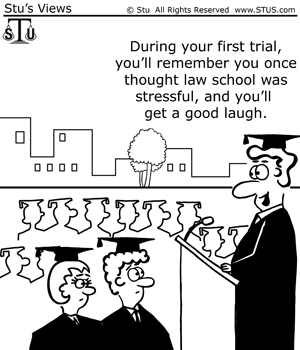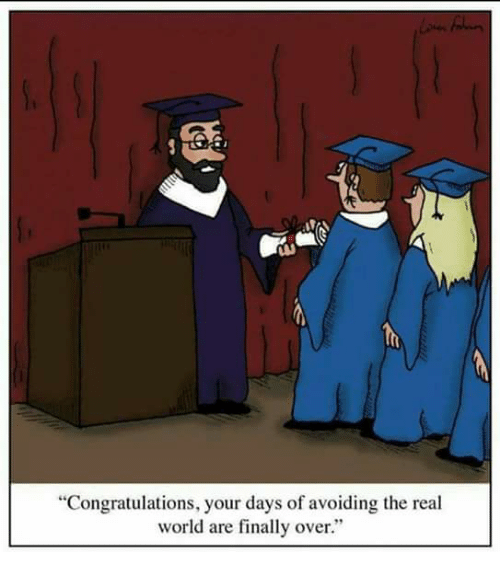
I recently completed my second year of teaching a course at the University of Calgary Faculty of Law. The course title is “Law 599.03 Legal Practice: Marketing & Client Development.” It should be called “Everything You Never Learned in Law School but Should Have. Until Now.”
Co-taught with the Director of Business Development and Marketing of a national law firm, Simone Hughes, the curriculum focused on career and client development and strived to teach students the skills required to become well-rounded lawyers – client focused, service oriented, community minded, market savvy, supportive colleagues, respectful of not only one another but of themselves – and not just really smart ones (preferring to leave that aspect of their education to the real profs). Bonus points if they can achieve this state without turning into a raging A-hole in the process. On that latter point, like launching a celestial orbiter to, well, Uranus, we won’t know if we’ve succeeded for many, many years.
With lawyers ranking ahead of only car salespeople and members of congress in terms of trusted professions, according to a 2019 Forbes survey, we harped throughout the course on the importance of exceptional service, business acumen, and personal brand. Clients, we constantly explained, often don’t know when they are getting bad advice, but they always know when they’re getting bad service. And, though most students answered my math question correctly (“what percentage of you will graduate in the top 10% of your class?”), that top decile will be of little use to their firms if they can’t actually engage with the client. They, along with the other ninety, were besieged with panels, articles, blogs, podcasts, and anecdotes underlining the paramountcy of human interaction, even — nay, especially — in a digital world that transcend transcripts and foretell the future.
We explained that if they chose a path that leads them in-house, no one wants their company counsel to be the Department of No. We brought in General Counsels to expound, ad nauseum, that effective in-house counsel are facilitators, not blockers. That they immerse themselves in the commercial goals of the enterprise and do everything they can to help their client achieve those goals, all while reducing, even if not eliminating, the risk to the company.

As for those who choose to remain in private practice and chase the elusive Brass Ring like dogs chasing a bunny around a racetrack, we brought in Managing Partners to counsel on the path ahead. We asked scores of actual clients about what lawyer behaviours annoy them. Delight them. Wished they’d do less of, more of.
We talked at length of the gestation period of a client relationship and the protracted span of time between conception and when a billing file actually enters the world.
A challenge in a course like this is grading. Second only to trying to get grades, I really hate having to give them. Students, of course, are slaves to grades, a subjugation enabled by the firms. Though they protest to the contrary, the firms themselves are hooked on the high of a great transcript. A harbinger, they think, of future ‘partner material’, whatever that means. Ironically, the singular criterion we are given when leading a partner recruitment, is portability of practice (aka client skills), not GPA. The addiction to grades is hereditary and incurable.
In one class, I excitedly rolled out a terrific panel of five General Counsels to whom the students would be making a fictitious pitch the following week. Rather than an appreciation for the opportunity to do something most partners at law firms would kill for (a dry run, with real time feedback, from five GCs, with no consequences) – okay, not no consequences for the exercise was graded, comprising 30% of the student’s final grade – I was bombarded with questions. Not about how ever I could cajole five senior executives to give up four hours of their day to come to campus and help out, but about how they would be graded. Bound though I was by the University of Calgary’s B curve – I felt liberated by my captors when I threatened at one point to give them all B’s so we could just move on. I may as well have yelled “fire” in a crowded theatre.
The disconnect, and this is on me, is that grades are inconsequential to my mind, but they are of singular and utmost primacy to the students. Grades are the only unit of measurement. The lone currency. My bias stems not solely from the fact that mine weren’t good, but from the fact that our clients don’t care about grades. It is said that “A students work for B students at companies founded by C students.” That’s certainly true around here and for this reason, we tried to limit the emphasis on grades and teach a more holistic and practical approach, including mental, physical, and even spiritual well-being. Silly us.
But there is one thing we couldn’t teach them, and that can’t be graded. It is easily the most important skill they must possess to survive, let alone excel in the legal ecosystem over the long term. This trait, one proven to be in shortest supply, is resiliency.
Dr. Larry Richard, of LawyerBrain, a consulting firm that specializes in helping AmLaw 100 law firms succeed by applying scientific principles to help improve the performance of their people, writes that “research into the lawyer personality has revealed that 90% of lawyers score in the bottom half of the scale on the psychological trait called ‘Resilience’. Low Resilience people tend to be relatively thin-skinned, defensive, and easily wounded by criticism, rejection or other setbacks. They don’t bounce back well from adversity.” I hadn’t noticed.
In my opinion, the reason there is such high attrition in law firms – articling classes of 15 in the big firms are often whittled down to one or two within five years – is that students do not adapt well when they undergo the transition from coddled recruits to real life employees. Our course tried to bridge that gap, or at least give them the tools and equipment to traverse it.

This is made more difficult on both sides of the crevasse – a Faculty of Law that has implemented rules and restrictions on the profs designed to ease the burden on the young learners; and a culture in law firms designed to compound it.
On the law school side, at U of C at least, final exams may not count for more than 50% of the final grade in a course unless justified on pedagogical grounds and approved by the Faculty. Make-up classes may not be held during the last two weeks of classes or during the three weeks preceding the final exam. No test carried out in the last two weeks of lectures may count for more than 10% of the final grade. Any assignments that are required to be submitted during the last two weeks of lectures may only count for more than 10% of the final grade if the student received the assignment six weeks before the last day of lectures. Changing the grading scale, assessments, assessment weightings, assessment due dates, etc. gives students grounds for appeal!

Is it any wonder, then, that when a law firm Partner drops an assignment on an Associate’s desk on a Friday at 5 p.m. asking for it back by noon on Sunday, that the young lawyer struggles… (“but Mr. Partner, this will account for more than 10% of my hours this month and it’s less than two weeks until my holiday…”).
Law firms aren’t blameless in this relationship. As coddled as (some not all) students can be as they enter profession, the firms (some not all) are equal parts unforgiving on them. The expectation goalposts are so far apart it’s no wonder attrition rates remain high, and we remain in business.
Also trying to bridge this gap is the The Canadian Center for Professional Legal Education (CPLED), who have recently developed a new bar admission course called PREP (Practice Readiness Education Program). The program has been adopted by Alberta, Saskatchewan, Manitoba and Nova Scotia and, after completion of two pilot projects, will roll out fully in all four provinces this year.
The program is based on a competency framework that was developed on the basis that law school is the best place for students to learn substantive law. However, most Canadian law schools do not structure their programs to teach students very much about how to practice law. For example, the new program covers hard skills like how to manage a file from start to finish but it also includes other important skills like how to manage client relationships, how to work with teams and how to manage the pressures of work on a lawyer’s personal life. The PREP program is set up to try and bridge the gap, as best it can, between law school and the realities of practice. This is particularly important when we know from recent survey results that articling experiences are inconsistent for students.
The approach being taken by CPLED in the PREP program is forward looking and is trying to ensure that students are a bit better prepared for the realities of practicing law.
Not only will our course, and the PREP course, and firms who embrace the virtues of teaching their young how to practice law, make for happier lawyers and lower turnover and greater resiliency but from a regulatory perspective the PREP program is important because it focusses on the skills and competencies that get lawyers into the most trouble.

Some lessons, though, are better lived than taught. Graduating law into a world of rising oceans and falling stock markets; a rapidly spreading virus contaminating the United States and the coronavirus too; a Canadian government that has its head up its Uranus, and a city hemorrhaging talent, capital and confidence will undoubtedly provide a crash course on the subject. And no, you may not appeal if you don’t like it.
Regards,
Adam